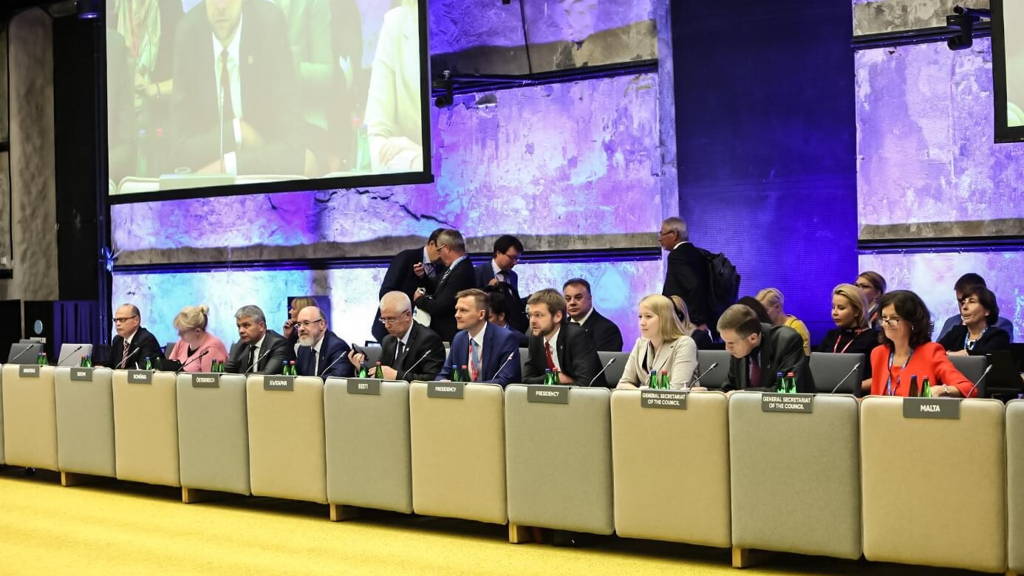The ministers identified three areas for closer collaboration among member states and possible actions at the EU level to overcome the main challenges of data-driven digital innovation in health.
Possible areas of further cooperation include:
In order to join forces, the assembled ministers welcomed the Estonian Presidency's proposal for interested member states to work together on tangible multi-country actions. The Estonian Minister for Health and Labour, Jevgeni Ossinovski, chairing the meeting, said member states face common challenges in ensuring the sustainability of their health systems and digital technologies must support the overall health policy goals.
“In e-health, European countries have been collaborating now for many years and important progress has been made in the implementation of electronic health record systems and e-prescriptions. Yet, we can do much more together to facilitate the use of digital technologies for the benefit of our people.”
Ossinovski stressed that Europe has embraced the technological transformation by boldly seizing the opportunities it has offered, but rapid change and new technologies also create vulnerabilities and concerns. “Our task is to balance the risks and benefits, and to find ways to ensure that the data is used securely and in a transparent way. This also means empowering patients by giving them the right to easily access their own personal health data, to decide how this data is used, and provide them with the means to do it in a secure and convenient manner all over the EU.”
To support the implementation of digital solutions, EU funding mechanisms were found to play an important role in leveraging member state investments in ICT solutions and e-health.
Andriukaitis underlined this is another example of collaboration between the Commission and member states working towards a digital transformation of the health and care systems in the EU.
Confidence in the timeliness of the action is further supported by the broad interest of stakeholder organisations through the Digital Health Society. More than 100 European organisations are working in cooperation with public authorities towards cross-border action commitments in the Digital Health Society to speed up the digitalisation of health systems across Europe.
Possible areas of further cooperation include:
- Better alignment of regulatory and data governance approaches when implementing the new EU data protection regulation.
- Extending the cross-border health data exchange.
- Building common data platforms to facilitate the reuse of data for research and innovation.
In order to join forces, the assembled ministers welcomed the Estonian Presidency's proposal for interested member states to work together on tangible multi-country actions. The Estonian Minister for Health and Labour, Jevgeni Ossinovski, chairing the meeting, said member states face common challenges in ensuring the sustainability of their health systems and digital technologies must support the overall health policy goals.
“In e-health, European countries have been collaborating now for many years and important progress has been made in the implementation of electronic health record systems and e-prescriptions. Yet, we can do much more together to facilitate the use of digital technologies for the benefit of our people.”
Data floods health sector
A digital Europe and the free movement of data is one of the overall priorities of the Estonian Presidency in the second half of 2017. With the spread of digital technologies, large amounts of data are produced in the health sector, which could be used for advanced data analytics to support the prevention and treatment of diseases and to contribute to research and innovation.Ossinovski stressed that Europe has embraced the technological transformation by boldly seizing the opportunities it has offered, but rapid change and new technologies also create vulnerabilities and concerns. “Our task is to balance the risks and benefits, and to find ways to ensure that the data is used securely and in a transparent way. This also means empowering patients by giving them the right to easily access their own personal health data, to decide how this data is used, and provide them with the means to do it in a secure and convenient manner all over the EU.”
To support the implementation of digital solutions, EU funding mechanisms were found to play an important role in leveraging member state investments in ICT solutions and e-health.
Communication on digital health
The European Commissioner for Health and Food Safety, Vytenis Andriukaitis, outlined the Commission's latest initiative in this area – the communication on digital health. The European Commission is launching a public consultation on the communication on digital health that anyone who uses, or is interested in, digital health tools can take part in. The communication will focus on three pillars in order to empower our citizens and keep EU healthcare systems sustainable and cost-effective:- The first pillar focuses on secure access to electronic health records and the possibility of sharing this information across borders.
- The second pillar will focus on supporting data infrastructures
- The third pillar focuses on citizens' empowerment and fostering person-centred care.
Andriukaitis underlined this is another example of collaboration between the Commission and member states working towards a digital transformation of the health and care systems in the EU.
Confidence in the timeliness of the action is further supported by the broad interest of stakeholder organisations through the Digital Health Society. More than 100 European organisations are working in cooperation with public authorities towards cross-border action commitments in the Digital Health Society to speed up the digitalisation of health systems across Europe.






